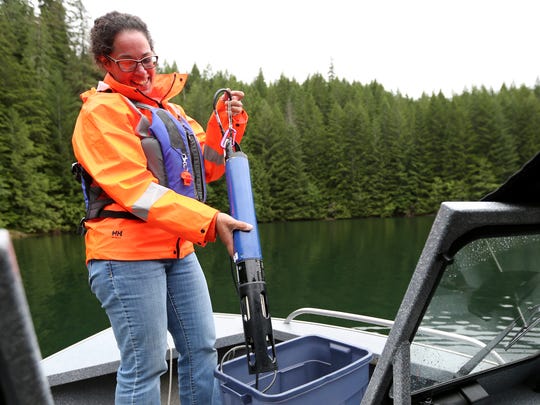Articles Menu
Two Oregon lawmakers want to protect public drinking water sources by banning clear-cuts, pesticide and fertilizer applications, and new logging roads on private forestland in those watersheds.
The aim is to prevent disasters such as last year’s Detroit Lake algae bloom, which shut down drinking water supplies in the state Capital for more than a month.
Supporters of House Bill 2656, dubbed the “Oregon Safe Waters Act,” say those forest activities degrade water supplies with sediments, chemical and thermal pollution and other contaminants, also increasing the risk of wildfires, flooding, and landslides.
“With climate change, we’re going to see more of this happen,” said Rep. Andrea Salinas, D-Lake Oswego, who is co-sponsoring the bill with Rep. Karin Power, D-Milwaukie.
The bill uses the federal definition of drinking water source boundaries, which together cover much of western Oregon.
 Buy Photo
Buy Photo
Beth Tanner, a field technician with the City of Salem, uses a sonde to measure water chemistry on Blowout Creek at Detroit Lake on Thursday, June 7, 2018. Water samples are being taken and tested everyday as a toxic algae bloom is being detected. (Photo: ANNA REED / Statesman Journal)
Private forests already are regulated under the Oregon Forest Practices Act. But environmental groups say the state’s rules don’t go far enough, and are weaker than those in Washington, California and Idaho.
“We do not have the same standards for forest practices our neighbors to the north and south have,” Salinas said. “Some of (Oregon’s) big timber companies also do harvesting in those states.”
Some of the state’s largest private timber owners, including Weyerhaeuser, Hampton Lumber, Stimson Lumber and Starker Forests, are fighting the proposal. They say private forest owners already are good stewards of their land.
“This bill would have devastating financial consequences for private forestland owners large and small and certainly for us here at Starker Forests,” said Gary Springer, a forester for the Benton County company.
Other timber owners support the bill.
Sarah Deumling, of Polk County’s Zena Forest Products, said her family has been practicing commercial forestry that would meet the requirements of the bill since 1987.
“Such a change in forest management would make Oregon truly a model of sustainable forestry and a wise state government would do all they can to help folks make the change,” Deumling said.
The bill has some exceptions.
It bans only harvest type 3 clear-cuts, which remove all trees and require reforestation.
And it allows the State Forester to approve an exemption to the rules for an ecological restoration project or a third-party approved management plan to improve long-term carbon storage and climate resiliency, if the state Department of Environmental Quality concurs.
Violations would be a Class A misdemeanor, carrying a fine of up to $6,250, 364 days imprisonment, or both.
More than 50 people signed up to testify during a public hearing on the bill Tuesday afternoon. Many did not get a chance to speak. As a result, the committee will continue to accept written testimony through March 21.
Salinas said the bill is especially important right now because forest operations are exempted from the sweeping carbon reduction bill expected to pass this session. House Bill 2020, the "Clean Energy Jobs" bill, would make the state’s largest greenhouse gas emitters pay for their emissions.
“We need to give industrial foresters and timber harvesters notice we’re not going to just drop the issue around the contribution they make to global warming,” Salinas said.
Contact the reporter at tloew@statesmanjournal.com, 503-399-6779 or follow at Twitter.com/Tracy_Loew